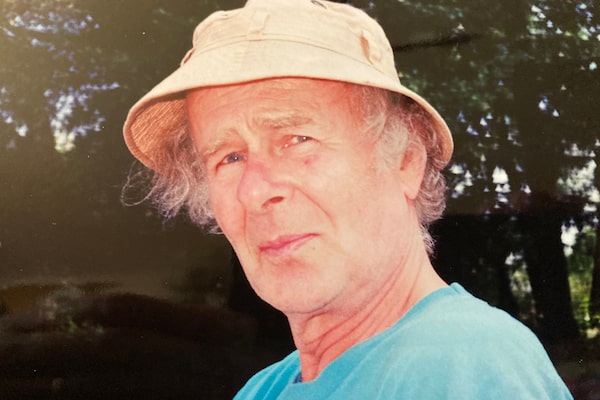Ernst Wilhelm von Graevenitz: Nature-lover. Pacifist. Father. Principled. Born Dec. 2, 1928, in Schilde, Germany; died Oct. 22, 2021, in Winnipeg, of chronic obstructive pulmonary disease; aged 92.

Ernst Wilhelm von Graevenitz.Courtesy of family
Ernst von Graevenitz wanted to be a farmer and live peacefully on the land. He grew up in a small village where his family had lived for over 600 years, but it was not to be. Ernst was 4 when Hitler became German Chancellor. At 15, he was drafted into the army. The Eastern Front rolled through his basic training unit, after days under fire from both German and Russian lines – he fell asleep in a foxhole and was captured. He spent nearly five months in a Russian PoW camp at Sagan. “All I thought about was food,” he recalled.
Ernst returned home only to find his family had fled and his home was occupied by refugees and Russian soldiers. After numerous perilous misadventures, he reached the Western Zone and through word of mouth, found his family on a farm near Hameln.
In 1953, Ernst immigrated to Ontario with his best friend. In return for their passage overseas, the two young men worked as farmhands. The following year, they were lumberjacks in northern Ontario then pushed on to Saskatchewan. Ernst was hired by a young farming family in Wilcox, Sask., and Matt and Dorothy Sattler became his adopted Canadian family.
This was critical when he developed tuberculosis and was sent to Fort Qu’appelle Sanitorium for 1½ years. Since Ernst could no longer manage hard farm labour, the Sattlers arranged for a $75 scholarship. With more luck – and better chess abilities than English – he studied agriculture at the University of Saskatchewan.
Here he met Canadian-born Alice Helene Hamp. They were opposites. Alice loved to dance; Ernst hated it. Alice was an extrovert, loved parties and people; Ernst always wanted to leave early. Somehow he wooed her. They married in 1960 and after 61 years together, his face still lit up when he greeted her.
The couple moved to Ontario for Ernst’s first job as a crop inspector. He had an easy rapport with farmers since they shared a preference for practical and economical solutions. Two daughters were born in Chatham, Ont., before they moved to Winnipeg in 1969, where their son was born.
In Manitoba, Ernst continued working as an agronomist for the government until his retirement in 1993. He always preferred being in the fields and returned often to the Sattlers’ farm for harvest.
Sometimes Alice would complain, “Can’t you just go out for a beer after work, just once?!” But being an introvert made Ernst the best father ever. Instead of going to the pub, he took his daughters for bicycle rides and weekend camping trips. (Leta and Heidi can now laugh about getting lost with their Dad and spending the night on a rock on the Manitoba-Ontario border with swarms of blackflies and mosquitoes.)
Ernst was vehemently atheist and apolitical. If he worshipped anything, it was nature. He could watch a bird, bee or squirrel for hours. But he would chase down the bear that stole his prized rye bread. On that camping trip, he returned with a slightly mangled loaf, then yelled at his family for not waiting in the car, “because bears are dangerous!” He proudly ate the bread for lunch.
Ernst was also a staunch environmentalist, known for his Sparsamkeit, or thriftiness. He was dedicated to public transport and was the first in his neighbourhood by decades to compost. He was a master of the two-minute shower and turned off the hot water if anyone tried taking long showers.
Ernst loved the Winnipeg Folk Festival and was a regular volunteer. He was a curler and avid curling fan – his family learned never to call during the Tournament of Hearts or the Brier.
Ernst knew that actions speak louder than words. It made him an excellent grandfather as he shared his love of nature with them on hikes, by driving through a bison herd, by tobogganing and sitting together under wide-open Prairie skies.
Heidi von Graevenitz is Ernst’s daughter.
To submit a Lives Lived: lives@globeandmail.com
Lives Lived celebrates the everyday, extraordinary, unheralded lives of Canadians who have recently passed. To learn how to share the story of a family member or friend, go online to tgam.ca/livesguide